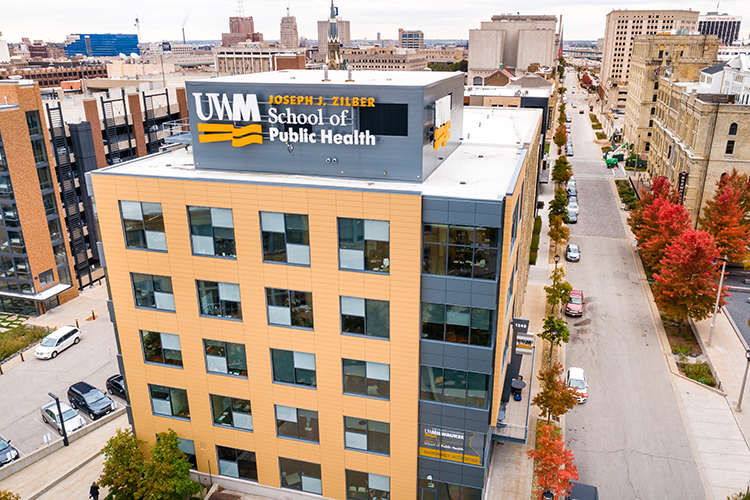
Zilber Family Foundation gives $20 million to UWM’s Zilber College of Public Health
Today, Zilber Family Foundation presented the University of Wisconsin-Milwaukee’s Joseph J. Zilber College of Public Health with a record-breaking $20 million gift to support faculty excellence and student achievement.
The funding will continue to advance health equity on behalf of the people of Milwaukee by supporting two endowments: the Zilber Faculty Excellence Fund and the Vera Zilber Student Program Fund. It’s an investment in the people who make the program a transformative force in Milwaukee.

Zilber Family Foundation Executive Director Gina Stilp speaks at UW-Milwaukee’s Zilber College of Public Health in Milwaukee, Wis. on Wednesday, July 12, 2023.
The Zilber Family Foundation presented a $20 million gift to the University of Wisconsin-Milwaukee’s Joseph J. Zilber College of Public Health. It is the largest single gift in the history of UWM and will advance health equity across the stsate, support faculty excellence and student achievement.
(UWM Photo/Kyle Bursaw)
“Zilber Family Foundation is honored to continue Joe and Vera Zilber’s legacy with a donation of the largest single gift in the history of the University of Wisconsin-Milwaukee – and one of the largest gifts given to a school of public health across the country,” said Gina Stilp, executive director of Zilber Family Foundation. “The $20 million commitment will continue to promote public health, prevent disease and advance health equity in Milwaukee for years to come.”
UWM’s Zilber College of Public Health is Wisconsin’s only accredited school of public health and one of only 56 such dedicated schools in the country. The college is a leading institution in advancing population health, health equity and social and environmental justice throughout Milwaukee, the state of Wisconsin and beyond.
“The Zilber Family Foundation’s landmark gift is a vote of confidence in UWM and the college’s future. It reinforces our pillars of faculty excellence, top-tier research, student access and achievement,” said UWM Chancellor Mark Mone. “This extraordinary gift significantly enhances our ability to recruit and retain top faculty members while accelerating and supporting the students who will become our nation’s public health leaders.”
A legacy of support
Zilber Family Foundation was founded in 1961 by real estate mogul Joseph J. Zilber and his wife, Vera, to champion efforts that address basic needs and ensure personal safety, increase access to social and economic opportunity and improve the quality of life in the city of Milwaukee.
In 2007, Joe Zilber donated $10 million to support the development of the UW-Milwaukee Graduate College of Public Health and the opportunity to educate a new generation of public health workers and changemakers. The college was established in Milwaukee’s Brewery District as an intentional force for revitalization and investment – a key priority for Zilber and the Foundation.
“The $20 million investment in the College of Public Health is a new phase in a longstanding partnership built on a shared belief in access to opportunity through education and the importance of health equity,” said Joan Nesbitt, UWM vice chancellor for university advancement. “With this investment, the Zilber Family Foundation is making a bold statement about the power of public-private partnerships to transform communities. The gift’s impact will reach far beyond Milwaukee, and it positions UWM as a leader in philanthropic initiatives that transform lives.”
The Zilber College of Public Health is now a thriving asset for the UW System, the Brewery complex and the Milwaukee community. It received accreditation in just 10 years, meeting rigorous standards in curriculum, research, community engagement, and faculty and student recruitment and retention. There has also been a notable economic impact, and since the establishment of the College of Public Health, the neighborhood has become a historic, sustainable pocket of the city, with the college functioning as an engine for engagement and connection.
“This gift is transformative,” said Amy Harley, interim dean of the Zilber College of Public Health. “A gift of this magnitude will launch us to the next level, especially with increased research output and a broader student and alumni base enhancing the public health workforce. The Zilber College of Public Health’s teaching, scholarship and service will have positive impacts in Milwaukee, Wisconsin and beyond.”
Such impacts get to the heart of the gift’s ultimate goal.
“This is an investment in the health and well-being of Milwaukee and the state of Wisconsin, and we look forward to a bright, healthy future together,” Stilp said.
View original UWM article here.
